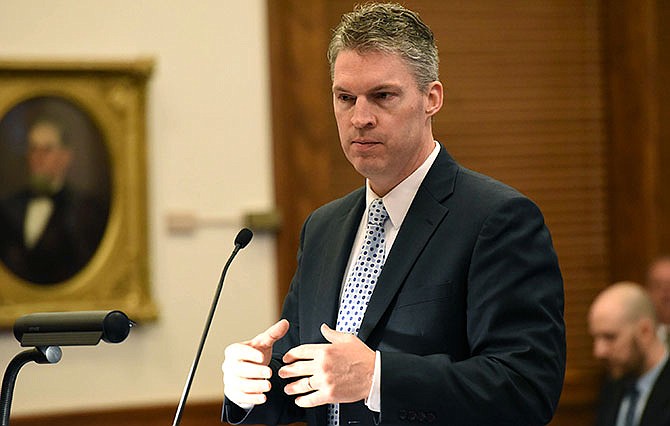At least three Missouri Senate committees and their chairmen - including Mike Kehoe, R-Jefferson City - last year violated the state's Sunshine Law every time they prohibited a Progress Missouri representative from recording pictures and audio during a Senate committee hearing, the group told the Missouri Supreme Court on Wednesday.
The group's lawyer, Christopher Grant, of St. Louis, argued against last summer's ruling by Cole County Circuit Judge Jon Beetem, dismissing that lawsuit against the Senate.
But Deputy Solicitor General Jeremiah Morgan, representing the Senate, reminded the judges Missouri's Constitution gives the Senate authority to determine the rules of its own proceedings, including the rule that allows committee chairs to determine when recordings can be made.
"The limitation on a "political question' is whether or not there's another constitutional provision that applies," Morgan explained. "But we're talking about a statute here - (which) doesn't overcome that political question.
"Even if they don't apply their rule properly ... that's still a political question."
Beetem's nine-page ruling June 30, granting the Senate's motion to dismiss the lawsuit, said it raised "political questions immune from judicial review."
But, Grant argued in written briefs and in Wednesday's oral argument, the high court should make a decision in the case.
"The issue here is whether this court has the power to interpret the Constitution, to review defendant's actions and to hold the Missouri Senate and its committees accountable to the clear requirements of the Sunshine Law," Grant told the seven-judge court.
"The state contends the issue is whether defendants" - the Senate and its leaders - "have the final authority to decide the scope of the Senate's powers."
Missouri's Open Meetings/Open Records law includes a provision that "a public body shall allow for the recording by audiotape, videotape, or other electronic means of any open meeting (and) may establish guidelines regarding the manner in which such recording is conducted so as to minimize disruption to the meeting."
Grant argued the Senate clearly is a "public body" as defined by the law and is covered by it.
But the Senate always has argued its Rule 96 controls its decisions, not the Sunshine Law.
The rule includes the provision: "Persons with cameras, flash cameras, lights, or other paraphernalia may be allowed to use such devices at committee meetings with the permission of the Chairman as long as they do not prove disruptive to the decorum of the committee."
Grant acknowledged the General Assembly has the power to regulate filming, and the Sunshine Law includes an express provision that the Senate may establish guidelines on how recording is conducted.
But, he added: "The Senate's rule is geared towards minimizing disruption. The record shows that plaintiffs were not disruptive."
Morgan said the Senate Communications staff records most hearings, and Progress Missouri can get copies from it.
Grant countered, on at least three occasions, the Senate communications staff didn't record part or all of a hearing the group was interested in but had been denied permission to make its own recording.
Judge Richard Teitelman and Morgan both noted the Supreme Court has separate rules for allowing the recording and taking still pictures of court hearings throughout the state - including the presence of a TV and a newspaper camera during Wednesday's hearing.
But, Grant noted, the Sunshine Law exempts the courts from its rules.
"This is something we've been working on and experiencing for a long time," Laura Swinford, Progress Missouri's executive director, told reporters. "It was great to have our day in court."
Morgan asked the court to rule the case as a political question, and granting or not granting permission to record committee hearings should be left to the Senate to determine.

